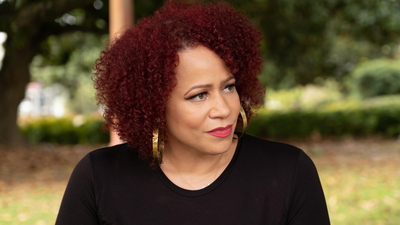Nikole Hannah-Jones Hopes You Have a Red Pill 'Matrix' Moment With '1619 Project' Docuseries
Hulu and Nikole Hannah-Jones turned the robust 1619 Project, moving pieces of journalism into a personal and compelling docuseries. They've also managed to usher in a new way to digest the historic essays originally published in print for The New York Times.
In 2019, Pulitzer Prize-winning reporter Nikole Hannah-Jones shared the all-encompassing 1619 Project, which shed light on the 400-year anniversary of the beginning of slavery in the United States. The ongoing initiative was created to reframe the space African Americans take up in the lexicon of our nation’s history, with Hannah-Jones setting out to acknowledge the role we’ve played in building America even amid mistreatment, while educating non-Blacks, too. Since its release, the initiative has come to include multiple books, a podcast, and now a six-part docuseries that premieres Thursday (January 26) on Hulu.
Executive-produced by Hannah-Jones and Oprah Winfrey and made alongside a lauded team led by Academy Award-winning documentary filmmaker Roger Ross Williams, The 1619 Project, like the original long-form journalism endeavor it stems from, was made to illuminate the story of Black Americans: enslavement, triumph, and much, much more. But for Hannah-Jones, it’s an extension of the ambitious work she strives to do as a reporter.
“My overall purpose of getting into journalism was to tell our stories and to expose the mechanism behind the inequality that we see,” she said over Zoom, adding that journalism is about trying to reach as wide an audience as possible and that Hulu taking on The 1619 Project is “a tremendous vehicle” in helping make that a reality for the initiative.
For The 1619 Project, Hannah-Jones was adamant about working with a Black production company on the series, which she found in Williams’ One Story Up Productions. She said she felt it was her responsibility to do this, using her position of power to lift up Black people and bring them aboard to tell our story. Hannah-Jones shared that almost the entire team was Black and predominantly included Black women, which is notable given the gendered diversity issues that Hollywood is constantly grappling with.
In the series, Hannah-Jones is an essential fixture, fusing her knowledge of the Black experience with her own personal history to anchor it all. Across the six episodes, she interviews activists, historians, and normal Black people who she calls non-celebrities (an intentional choice), as they help her guide viewers through navigating the difficult conversations surrounding African American history.
Hannah-Jones shared how in creative meetings with the team behind the series, Williams wanted her to play the role of a guide.
“They thought it would be a great personal connective tissue between these episodes where you’re going to be meeting all these different people,” she said, adding that she was a little reticent at the idea initially. She changed her mind when she realized that, as a storyteller, this could be a way of stepping into her power, which is evident across the series.
With each episode being based on essays from the 2019 print project, the show offers a fleshed-out depiction of complex topics. “Music,” the third episode in the series, stood out because of the personal touches that were a part of it. Shot inside Hannah-Jones’ dining room, the episode features the reporter speaking with critic Wesley Morris on her father’s relationship with music, with the two also taking a tour through her father’s record collection she inherited after he passed.
In speaking about her father, Hannah-Jones weaves his musical tastes with the resilient nature of Black Americans who created musical genres like the blues and jazz. Wanting “Music” to provide a breathing moment for viewers in the series, Hannah-Jones spoke on the significance of this episode, saying: “Out of the horrible circumstances that we were being forced to live in, we were creating, and music was a means of survival in many ways.”
“Of course, out of this suffering, we create the original forms of American music. And so, I really wanted to give us that moment to acknowledge the beauty of creation and resiliency,” she added.
The plunge into the realm of television was new for Hannah-Jones. As a reporter, she said she’s mainly used to working alone in isolation, but television is different due to the level of collaboration common in the TV industry. Even with this newness, she said she loved every part of working with Williams and One Story Up, adding that she trusted them throughout the process.
As for her hopes for those who watch the docuseries, she wants them to leave feeling more knowledgeable about the history and contributions of Black Americans, saying: “The 1619 Project should feel like taking the red pill in The Matrix. You have a society, [and] no idea why it works like it does, and you accept that this is how it has to be. But if you learn this history, you’ll see that this was all constructed.”
